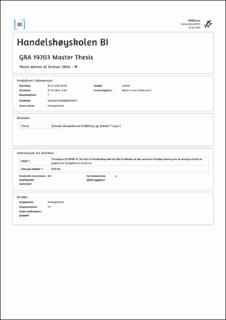The impact of COVID-19, the Suez Canal blockage and the War in Ukraine on the container shipping industry and an analysis of how to prepare for disruptions in the future
Master thesis
Permanent lenke
https://hdl.handle.net/11250/3038283Utgivelsesdato
2022Metadata
Vis full innførselSamlinger
- Master of Science [1621]
Sammendrag
The container shipping industry is considered the backbone of global trade and is therefore of severe importance for our globalised business world. COVID-19, the Suez Canal blockage, and the War in Ukraine are unprecedented events in modern history and indisputably impacted the worldwide flow of goods. The authors have analysed how these disruptions have impacted the container shipping industry. Further, the thesis discusses how the industry could have dealt with the issues that followed and be better prepared for new situations like these in the future.
This master thesis has used a qualitative research method to answer the research question: How have disruptions such as COVID-19, the Suez Canal blockage and the War in Ukraine influenced the container shipping industry, and how can the industry prepare for disruptions in the future? To answer this, data were collected entirely through literature. The theoretical background, which consists of SCM, disruptions, SCRM, resilience, reliability and industry 4.0, forms the basis and builds evidence for the analysis and discussion. The study has shown how dependent the flow of worldwide goods is on well-functioning container shipping and how vulnerably it is to external disruptions. Our findings revealed how reliable the industry is on human workforce. During the pandemic, the lack of workers caused massive bottlenecks in the ports and created container shortages in the industry. Consequently, the container freights rates spiked and the reliability in the industry decreased.
The main conclusion that can be drawn from this study, is that industry 4.0 technologies could enhance SC and container shipping performance when experiencing unexpected disruptions. Applying technologies could increase the efficiency, transparency and collaboration between SC entities, something that increases reliability and resilience, and better prepare the industry for future disruptions.
Beskrivelse
Masteroppgave(MSc) in Master of Science in Business, Logistics, operations and supply chain management - Handelshøyskolen BI, 2022
